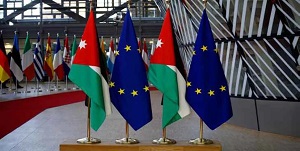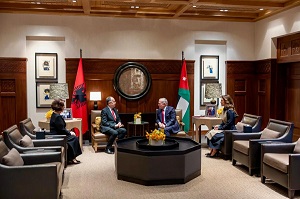Towards a New Arab-American Era Based on Common Interests - By Eyad Abu Shakra, Asharq Al-Awsat
International relations are based on interests, not liking or disliking one another; with stability very much a top political priority. Subsequently, the more stable an influential superpower is, the easier it is to carry out dialogue or manage differences. This issue also applies to regional equations and conflicts, as well as internal crises.
Thus, there is nothing worse than chaos. Any country finds it easier to acclimatize with others’ clear policies - even when not being perfect - than it can when there is vacuum or confusion that never produce results to help governments adopt meaningful approaches.
Given the above, and regardless of what one thinks of the USA as a superpower, or its government and its institutions, its stability is in the best interest of the international community. On the other hand, I dare to say, that despite the acute political division reflected in the November 3rd elections, the USA has enough mechanisms, laws, rules, and networks of vested interests capable of arresting current divisive tendencies.
A proof of this has been how the world community, especially the major Western democracies, rushed to congratulate the President-elect before the official declaration of the result. This confirms both the fairness of the elections and their confidence in the American system. Even China, America’s leading competitor on the world stage decided not to wait too long before sending its letter of congratulation; leaving only Russia behind.
There is no need to recall the 2016 Presidential elections, after which Moscow was accused of interference and hacking; which led to setting up a Special Investigation Commission (2017-2019) led by Robert Mueller.
The Mueller Commission eventually came up with a technically detailed report saying that it did not find “sufficient evidence” that the (Trump) campaign “coordinated or conspired with the Russian government in its election-interference activities”.
We have also been aware that many Democratic politicians in Washington, as well as several European politicians, have since accused the Russian leadership of trying to influence internal politics and general elections in many European countries. Moscow’s alleged attempts mainly aimed at supporting marginal ultra-nationalist and extreme isolationist groups within these countries; in order to sow the seeds of chaos through actions and reactions from extremist rightwing and leftwing groups.
Thanks to the retreat of its Western competitors and their internal problems, Moscow’s attempts have been successful, as it scored significant tactical global victories despite its acute economic problems. Among the aforementioned internal problems are the crises of immigration, racism, terrorism, Brexit, inter-European tensions, as well as Washington’s shifting its traditional ‘animosity’ from Russia to China, and adopting protectionist and isolationist policies that have strained its relations across the Atlantic.
Soon enough, the Covid-19 pandemic hit America in early in 2020, and confirmed Washington’s isolationist attitude. President Trump began calling the virus the “Chinese Virus” since it emerged from the Chinese city of Wuhan, and because Beijing “kept quiet” about it.
Later on, Trump capitalized on the World Health Organisation’s confusion and indecisiveness in the face of the worsening pandemic, to go further in a fight against the UN agencies, including WHO, which he boycotted after accusing it with ‘failures’ and ‘collusion with China’.
All this pertains to the US-Russian ‘accounts’ inside the US, and whether Moscow intentionally embarked on spreading chaos and fomenting instability within American society and undermining its unity and political institution. However, as far as Moscow’s national interests are concerned, they obviously depended on Washington’s retreat or even withdrawal from particular strategic regions, among which are the Middle East and North Africa.
The Arabs, evidently, know better than most how Barack Obama’s administration dealt with the Middle East’s affairs. They are well aware that had it not been for the disastrous way it handled the Iranian file, the Arab world would not have reached the horrible situation it is in today.
Just as a reminder, the Obama administration adopted three fatal approaches prior to the ‘Arab Spring’ early in 2011:
1- Tacit, then open OK, and then active support, to bringing down pro-Washington and ‘anti-Political Islam’ regimes, without insuring an alternative that Washington was truly willing to accept. In fact, Obama’s Washington, itself, used the extremist groups coming out of the cloak of traditional ‘Political Islam’ as excuse to justify its alliance with the Iran leadership. Noting that Obama candidly said that Iran’s brand of ‘Political (Shi’ite) Islam’ was “not suicidal”!
2- During the ‘Arab Spring’, the Obama administration worked to marginalize its closest Arab allies when it kept them in the dark about its negotiations with Iran. This happened despite Washington being aware that Iranian expansionist ambitions concern them, and threaten their people.
3- Those negotiations were focused on the technical side of Iran’s nuclear file, with total disregard to its geopolitical dimensions. Thus, the negotiations became nothing more than an ‘understanding’ that allows Iran to fulfill its regional political ambitions through its ‘classic’ arsenal without the need for nuclear muscles. In fact, since then Iranian boasts about “controlling four Arab capitals” became familiar.
These three approaches have created the Syrian tragedy and speeded up Iranian control of Lebanon, Yemen, and most of Iraq. Consequently, they were the main reasons why a large percentage of Arab public opinion sided with Donald Trump in 2016. Thanks to his withdrawal from the nuclear deal, many in the Arab world continued to support Trump this November, despite his whole-hearted backing of the Likud policies in Israel.
Well, now after the US elections, we are facing a different scenario that requires wise endeavors. Four full years have passed, and the political landscape of the Arab Middle East looks really different. Still, some of the names being suggested as future administration members under President-elect Joe Biden do not reassure many Arabs, as they have strong and old links to the ‘Tehran lobby’ in Washington. But having said this, lines of political and diplomatic communications are there and must be used and invested in. Furthermore, it is important to conduct dialogue with Democratic leaders who are less dogmatic than Obama, and more willing to realize the dangerous strategic consequences of betting on a theocratic-militaristic regime that incites all kinds of sectarian violence.
Dialogue is always needed; and in Washington’s case necessary; more so, after it has discovered who benefited most from its regional retreat.
Latest News
-
 Jordan, EU to convene major investment conference at Dead Sea on April 21
Jordan, EU to convene major investment conference at Dead Sea on April 21
-
 US, Canada issue travel warnings for Mexico after drug kingpin killing
US, Canada issue travel warnings for Mexico after drug kingpin killing
-
 Ukraine needs $588 billion to rebuild from war — report
Ukraine needs $588 billion to rebuild from war — report
-
 King, Albania president hold talks in Amman on expanding cooperation
King, Albania president hold talks in Amman on expanding cooperation
-
 Jordan reaffirms it will not be launch point for military action against Iran
Jordan reaffirms it will not be launch point for military action against Iran